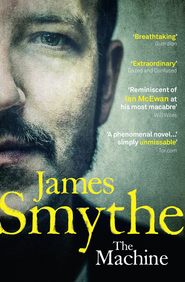По всем вопросам обращайтесь на: info@litportal.ru
(©) 2003-2024.
✖
No Harm Can Come to a Good Man
Автор
Год написания книги
2019
Настройки чтения
Размер шрифта
Высота строк
Поля
‘Where are you?’ Amit asks.
‘At the lake house.’ Laurence doesn’t let go of the wrench; he’s still forcing it, still trying to get the water to flow.
‘You shouldn’t have run off. There are people asking for you.’
‘Tell them it’s family time. Tell them this is the sort of candidate I’ll be: a man who gives a shit about stuff like that still.’
‘You done the questionnaire yet?’
‘No. Not even close.’
‘Larry.’
‘Amit.’
‘You need to, you know that.’
‘I know,’ Laurence says. He looks down, pulls the phone away from his ear. It’s wet with sweat and, as he wipes the screen of the phone on his shirt, the light dances across the muddy water at his feet. There are ripples and he feels the water lapping at his ankle, the energy that it carries coming through and tickling the hairs on his legs. The sound of it echoes in the space. He wonders if this is an effect of his effort, maybe the pipes shuddering as they try to let their water out. It picks up, suddenly more violent, tiny waves coming from the far wall. ‘I have to go,’ he tells Amit, and he hangs up the phone, shining the light again. The waves bounce the light around. He walks towards the wall that the ripples seem to be coming from. He crouches and presses his hand against it, feeling around. There’s a crack in the concrete; it’s only slight and he can’t tell if that’s the cause of this, but it feels like it is. A crack like this, there has to be repercussions. He wonders where this has come from.
The house is empty and quiet apart from the reverberations of the water in the cellar as it eases, as the waves die down. He thinks about washing his feet, which are the color of soot now, so he walks upstairs and through the kitchen, to the outside. The back door is already wide open. He pads along the dock and catches himself looking across the water again. He’s sure that he can see something in the distance, across the water, through the mist, a light, or the reflection of a light. He stares at it. It’s almost hypnotic, for that second.
It’s only so slight.
He sits and dangles his feet in the water, and they are wet, and he looks down at them to see if they’re clean yet and there is Sean, suspended underneath, the crown of his head jutting from the surface. Laurence stares for a second as he tries to parse what he’s just seen and then he hurls himself down from the dock and he pulls at his son’s head and shoulders, trying to yank him up, but the boy doesn’t move. Laurence heaves in air and then dives down, frantically pulling at his son’s limbs, using his body almost as a ladder to get lower, and then he finally feels the weeds that are wrapped around Sean’s foot and ankle, going between his toes and all around, and he wrenches but they won’t tear. The weeds are like thick rubber.
So he feels lower, to the root, thinking that might be easiest. He finds it up against concrete at the bottom of the house, the foundations at the base of the dock. This is where the weeds have grown, boring into the concrete and cracking it. The wall here leads to the cellar. This is what caused the flooding; and what Laurence felt around his own legs, his son’s frantic and desperate kicking before he stopped breathing.
Laurence pulls that part of the plant out somehow and thinks, in that second, of those moments where people find superhuman strength when in crisis, and Sean’s body drifts upwards. It’s free. He grabs it and he pushes his son’s head above water, then climbs out onto the dock, pulling Sean with him. He tries to give him mouth-to-mouth as he knows to do it. He pushes on Sean’s chest, worried about doing it with too much force. He doesn’t want to hurt him. He turns his head and he breathes into his boy’s lungs again.
‘Please,’ he says, ‘oh God, please,’ and he breathes again; and then so does Sean, coughing up water. He doesn’t open his eyes, and his breathing is shallow and labored, heaves that sound somehow less than human. Laurence runs for his phone and dials 911. He shouts about where they are but the address is hard to find. He describes it to them and they say that they’ll be minutes. Support him, they say. Keep him breathing. If he stops, breathe into him again. Keep repeating this.
He does. He hangs up and he waits for the ambulance and he watches his son’s face so closely that he hopes Sean can feel his hot breath on his skin, willing him to stay alive.
It’s only a minute before the Staunton Sheriff’s department arrives. They come tearing down the track and the deputy gets out and rushes to the boy, taking over. Laurence backs away and watches it all as if from a dream.
Deanna storms through the house, shouting Lane’s name. She goes to her room and throws the door open and her daughter is there, on her bed. There’s a boy with her; he’s not like Deanna imagined, being clean cut, wearing a bright rugby-style shirt; or, he was. Now, it’s on the floor at the foot of the bed. Deanna doesn’t even look at him; she stares instead into her eldest daughter’s eyes.
‘I’ve been calling you.’
‘I was busy,’ Lane says, but her voice is shaking and weak. She’s ashamed, whether she’ll admit it or not.
‘Get dressed,’ Deanna says, ‘you’re coming to the house with us.’
‘No,’ Lane replies, and Deanna is about to shout at her, and to shout at this boy, to tell him to get out of the room, when her own cellphone rings. It’s Laurence. She turns away from Lane’s room, hearing her daughter and the boy fumble for their clothes, and she answers. Dumbly, she listens to his slow, measured politician’s voice as he tells her what happened, or some version of it as best he understands it; that Sean is alive and being treated. He tells her about how he found him, and how he didn’t know. Deputy Robards came, and he held Sean’s tongue back, because their son began choking on his own tongue, and Sean nearly bit through the finger. Apparently that’s a good sign, Laurence says. He has bite marks, almost through to the knuckle; that detail, offered up. She didn’t need it but Laurence stresses: this is a good sign.
‘How long was he under the water?’ Deanna asks.
‘Minutes,’ Laurence tells her. ‘Six or seven minutes, maybe eight. I don’t know.’ He tells her to come to the hospital. She says that she will.
Lane stands in front of her mother. She can see it in Deanna’s face.
‘I need you to watch Alyx,’ Deanna says.
‘What’s happened?’ Lane asks. No antagonism, no challenge. She knows from the look she’s being given that this is serious.
‘Your brother fell into the lake,’ she says. ‘He’s alive.’ That seems enough; a thing to latch onto for all of them, and then she goes to the car and gets in and starts the engine. She doesn’t need anything else. She drives.
This is the first time that she’s had to go to hospital for one of the kids. They were lucky with Lane: ten years older than the twins, and Deanna and Laurence were ten years younger when they had her, ten years more stupid; but still they got through with her having nothing more major than a scrape or two. Nothing broken, nothing lost, no emergency trips to the hospital. Maybe, she thinks, they got complacent.
She thinks about the eight minutes that Sean was underwater. She wonders if eight minutes is a long time to not take a breath.
She doesn’t know the way to the hospital. She relies on the ClearVista app on her phone to tell her where to go. She listens to its voice and tries to let that be all that she can hear.
She parks in the short-stay – because, she thinks, that’s all this can be, because she’ll go in and they’ll be sending Sean home with some medicine or an inhaler or something, and a lesson learned about what to do and what to not and when to listen to your parents, because that’s the sort of injury that kids recover and learn from – and she rushes in, past the ambulance bay and into the ER reception. There’s a queue at the window, so she waits, and she looks for her son. Maybe he’ll be sitting out here waiting for her himself, because it’s not at all serious. They have let him go already, this was a false alarm. Instead, there are people with bloody noses and hands wrapped in bags of frozen vegetables, and one woman whose skin is almost green, her eyes rolling back in her head, froth around her mouth. There’s a television above them, tuned to the news. They’re talking about Laurence, running a special later on, about his political career so far. She hopes that she isn’t still waiting here to see it.
‘Miss?’ the woman at the desk says. Deanna doesn’t hear her. She’s somewhere else: imagining Sean in the water, imagining how he took his dive from the dock, and how he arced through the air; and why he didn’t come up again. She can picture it, as if she is there. She doesn’t know how. She is trying to imagine what was going through his mind. How lost he was, and how he needed her. Maybe he called her name through the water …‘Miss? Can you hear me?’ Deanna turns. The woman behind the counter is impatient already.
‘My son’s here,’ Deanna says. ‘I don’t know where he is. My husband brought him here in in an ambulance. He drowned.’ Such finality in that phrase.
‘Name?’
‘His name? It’s Sean. Sean Walker.’ The woman types and stares at her screen. Deanna imagines the notes shared on these computers: even down to letting the front desk staff know how to treat the situations. The patient is fine. The patient is in stable condition. The patient is dead. Morgan – Deanna reads her name badge – doesn’t say anything for a while. Instead she follows the notes on her screen, and then she sighs. It’s almost imperceptible, but Deanna is watching for it. She’s so focused now on this moment and nothing more. No point in dwelling on what happened before. This is all about what happens from this moment on.
‘Okay,’ Morgan eventually says, ‘so you’re going to come with me through here now.’ She stands up from her desk and lifts the entry flap, and she puts her hand on Deanna’s elbow to lead her through.
‘Is Sean okay? Can I see him?’ Deanna asks.
‘Your husband is through here,’ Morgan says, ‘and the doctor will bring news as soon as she’s got some.’ They pass bays of beds where doctors fix the damaged and then reach the room. It doesn’t have anything printed on the door: there’s a darkened glass window in it and nothing more. There are three more of them adjacent, Deanna sees, but she can’t see if they’re vacant or not. The door creaks on the swing, and Laurence is there and he rushes to her. He’s still damp, wet from having dredged Sean out of the water, but he’s got his suit jacket back on. He shakes, a towel wrapped around him, and she holds him. It’s not his fault, she tells herself. It’s not. He sits down, and she does, and they don’t talk.
The room is pale and bare. There are six chairs arranged as if for dinner, one at the head of the table, one at the foot, two on either side; and the table in the middle is low, cheap wood, covered in coffee stains. There’s a green plastic box in the center filled with tissues. The box, Deanna notices, is glued to the table. There are no magazines, no television, no water cooler: this is like no waiting room Deanna has ever been in before. The chairs are covered in a fading red woolen fabric, but the arms have started to be unpicked, the strands pulled out and played with; worried. The carpet has, around the table, been worn into a path, like a running track. The ceiling tiles are yellowed with cigarette smoke. It’s been decades since you were allowed to smoke in buildings like this, and nearly twenty years since Deanna last had a cigarette; but now she looks at that and she misses it, because if ever there was an occasion it is now.
‘I have to see if there’s news,’ Laurence says. ‘I’ve spoken with Amit, asked him to come.’
‘Okay,’ Deanna says. He stands up and leaves, padding into the hallway – she watches him, sheet draped over his shoulders, looking for all the world like any other patient of this place – and she takes out her phone. She texts Lane – No news xxx – and then opens the ClearVista app. Predict anything with our groundbreaking algorithm, it reads. The numbers don’t lie. She logs in and selects Sean’s name from the drop-down list of her dependents, and then starts to type what she’s looking for. Predict how long you can survive, she types, and it fills out the rest for her, guessing at her request. Without breathing, the second most requested search beginning with that phrase. She clicks the completed sentence. The little icon spins around (While you are waiting, did you know that ClearVista can help you predict your chances of love with a new partner to a ninety-three percent accuracy?) and then it gives her its answer.
We predict that Sean Walker can survive for 102 seconds without breathing, it says. She turns the Internet browser off and puts the phone back into her pocket. She fingers one of the tissues from the box, and she feels how thin it is, and somehow that’s what sets her off.
Deanna looks out of the window. There’s only one, and it looks out onto the gray concrete rear of the buildings. The fans from the air vents, the delivery area for medical supplies, a chain-link fence. There’s nobody walking past, gawking in, which is a relief. The afternoon sun, briefly, shining through the window and onto her face. She’s looking out when the door to the room opens and she sees the doctor’s face reflected in the glass. She turns. The doctor takes her glasses off before saying anything, and she shakes Laurence’s hand, and Deanna’s, and Deanna thinks how warm her hands are. She keeps thinking about that warmth all the way through the explanation of what happened: that there were two sets of injuries to deal with: because when he stopped breathing it caused an embolism; and then his lungs were flooded as well, because before he stopped he tried desperately to breathe, taking water in where it should only have been air. The doctor is amazed that Laurence managed to get him breathing at the scene. She says something about Sean being artificially alive; or how he was. She doesn’t say the words about what exactly happened after was, which makes it worse for Deanna, somehow. Everything sounds as if she is at altitude and her ears have popped, fading off into a fog of words that carry no meaning.
‘I’m sorry,’ the doctor says. That’s all they need. Laurence holds Deanna, and he cries into her shoulder, and he falls to his knees and he screams but it comes out like he’s gasping for air; but Deanna cannot soothe him. She is still picturing Sean stuck under the water, looking up at her, calling his father’s name, desperately clawing at the surface of it, unable to break out; knowing what is coming as he drowns.
3 (#ulink_a06c444b-959c-5bd6-937d-8a2385412a36)
The next year is the worst of their lives.
The funeral happens a week to the day after his death. Sean’s skin was a shade of gray when they looked at it in the hospital. The make-up artist tells them he is one of the best and Laurence wonders what scale that’s on: town, or state, or country, or even the world. He asks, bitterly, if there are competitions to decide such a thing: a parade of bodies lined up to be perfumed and preened? When they finally see Sean, his skin is the abnormal pink of a child’s doll. They refuse an open casket, then, because this isn’t their son any more. Laurence can’t stand to look at him, or even at the casket as it lies on the table. They invite anybody who wants to come to the funeral, and pretty much the whole town does. They all bring trays of pies and pasta and salads, and they leave them piled up in the kitchen, shake Laurence’s hand and kiss Deanna’s cheek, say how sorry they are. Everybody in the town knows them; most remember Deanna from when she was a child. And they all knew Sean, and they all want to say goodbye to him. Everybody steps up to the closed box on the table and stands over it; they tell Sean whatever it is that they have to say. Alyx doesn’t come, because Deanna doesn’t know if that’s right. Deanna explains it to her.
‘Sean’s gone to heaven,’ she says, almost without thinking, and that starts a conversation that she then feels pitiably unable to deal with, but she tries. She buys a Bible for the express purpose of giving Alyx the story about how it works. She argues with Laurence that grief needs an outlet and that this might be a good one for Alyx. Laurence doesn’t like it – he’s practical about religion, pragmatic, as badly as that plays with the South; and now he’s more stubborn. Any shot at belief that he maybe once had is devastated by the loss of their son – but, Deanna argues, that’s beyond the point. The point is: Alyx needs it. She was a twin, and she is now missing the person she was closest to in the whole world. She’ll never know that closeness again.










